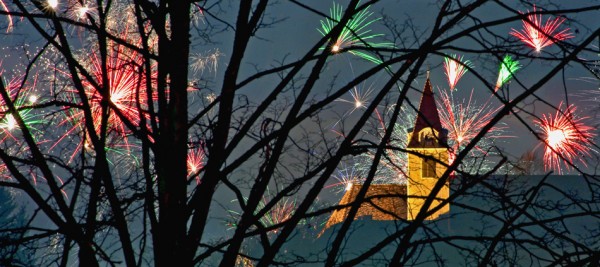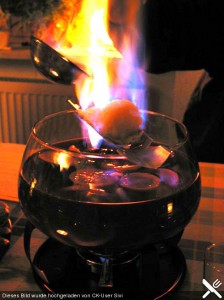Cleachdaidhean Oidhche Challainn sa Ghearmailt – How Germans celebrate Hogmanay
Ged nach eil na Gearmailtich eòlach air mòrchuid den cleachdaidhean againne – tha iognadh mòr aca nuair a bhios mi ag innse dhuibh mu first-footing is a leithid sin, tha cleachdeaidhean inntinneach eile acasan , agus tha fiù ’s rud no dhà againn an cumantas.
Bleigiessen = leaghadh luaithe.
Cruinnichidh an teaghlach no buidheann charaidean timcheall air a’ bhuird, is seo nas fheàrr ri solas coinnle, agus fear mu seach cumaidh iad pìosan beagan de luaithe ann an seann spàin os cionn lasair coinnle mionaid no dhà. Bi an luaithe a’ leaghadh gu math luath, leis gu bheil e cho bog , agus às dèidh sin thèid a leagail a-steach ann an uisge fuar, far am fàs e cruaidh a-rithist, ach ann an cruthan neònach. An crochadh air na cruthan a th’ ann, chì thu am bi deagh no droch fhòrtan agad sa bhliadhna sa tighinn. Seo feadhainn dhiubh:
ball – bi deagh fhòrtan a’ roiligeadh do d’ ionnsaigh.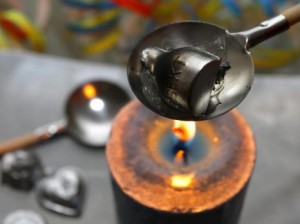
acair – gheibh thu cuideachadh nuair a bhios thu nad èiginn
flur – caraidean ùra
cearcall / fàinne – banais – ach ma bhios e briste, tha sin a’ ciallachadh dealachadh!
àradh – àrdachadh inbhe no pàigheaidh aig an obair
clag – deagh naidheachd
siosar – tha co-dhùnadh air thòiseach ort
long, bàta – bi thu a’ dol air cuairt no air turas-mara
damhan-allaidh – tha d’ fhòrtan a’ crochadh air snàthainn sìoda
nathair – tha farmad aig cuideigin riut – bi faiceallach!
An latha an-diugh gheibh thu ‘kits’ le pìosan luaithe ann an cruthan eadar-dhealaichte (gus an tòisich thu leis an t-seòrsa fhòrtanach, co-dhiù!), spàin chruinn agus mìneachaidhean ‘ofigeil’, ann an gach bùth fad na Dùbhlachd. Air sgàth ’s nach eil luaithe glè slàn do chlann, no math don àrainneachd, thèid cèir a chleachdadh cuideachd.
Feuerzangenbowle = punch flambé le ruma, siùcar agus fìon dearg
Seo rud a ghabhas àite am broinn an teaglaich no buidheann charaidean ri solas coinnle cuideachd, ged nach eil cleachdadh sin dìreach freagarrach do chlann. Tha feum agad ri pana fìona dheirg air rechaud no stòbha, airson fìon teth ullachadh le spìosraidhean, orainsearan is liomaidean, agus seòrsa clobha os a chionn le còn cruiadh siùcair. A-nis dòirt rùm air an t-siùcar agus cuir e na thèine. Cùm ris an dòirteadh gus an leagh an t-siùcar. Òl am punch teth anns an eadar-àm!
Dinner for One – seann chomadaidh-telebhisein Beurla
Iongantach mar a tha e, sin am prògram as fheàrr leis na Gearmailtich gach Oidhche Challain. Chan eil e ach 10 mionaidean de dh’fad agus ged a tha cothrom air fo-thiotalan ann, ’s urrainn do Ghearmailteach sam bith gach facal sa Beurla a ghabhal còmhla ris na pearsantan. Chaidh am film a dhèanamh ann an Hamburg ann an 1963, le Freddie Frinton mar sheann bhutler, James, agus May Warden mar Miss Sophie, bean uasal aosda, a tha 90 an diugh. 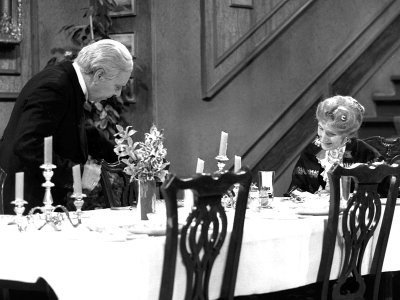 Tha am bòrd air ullachadh airson ceathrear aoighean (neo-fhaicsinneach), gu follaiseach seann shuirghichean aice, agus tha e aig James ris gach pàirt a chluiche agus ri òl air an son, fear mu seach, fad an fheasgair – sherry, champagne, fìon, port, an còmhnaidh leis na faclan ainmeil : ‘Same procedure as last year, Miss Sophie?’ – ‘Same procedure as every year, James!’.
Tha am bòrd air ullachadh airson ceathrear aoighean (neo-fhaicsinneach), gu follaiseach seann shuirghichean aice, agus tha e aig James ris gach pàirt a chluiche agus ri òl air an son, fear mu seach, fad an fheasgair – sherry, champagne, fìon, port, an còmhnaidh leis na faclan ainmeil : ‘Same procedure as last year, Miss Sophie?’ – ‘Same procedure as every year, James!’.
Tha fiù ‘s Gearmailtich gun Bheurla eile sam bith eòlach air na seantansan seo, agus is mòr an t-iongnadh orra nuair nach bi sgot aig daoine à Breatainn dè mu dhèidhinn a bhios iad a bruidhinn.
Tha am film air YouTube: http://www.youtube.com/watch?v=b1v4BYV-YvA
Feuerwerke – Teintean-Ealain
Aig meadhan-oidhche tha Sekt ann, seòrsa champagne Gearmailtich, tha na clagan-eaglaise a’ seirm, agus tha teintean-ealain nas lugha anns a’ ghàrradh agad fhèin no feadhainn nas motha anns a’ bhaile – ann an Cologne agus Bonn air bruachan na h-aibhne Rhine, agus tha na mìltean de dhaoine ann airson fàilte a chur air a’ Bhliadhna Ùr.
***
German Hogmanay customs
Although Germans are unfamiliar with our ‘curious’ customs like first footing, they have some interesting ones of their own – here are a few.
Bleigiessen – lead-pouring.
The family or a group of friends gather round the table by candle-light and take turns at melting pieces of lead in an old spoon over a candle-flame. The soft lead melts quickly, then they drop it into cold water where it hardens into strange shapes. Depending on the shapes, the year will bring you good or bad fortune, or both:
Ball – good luck will roll your way
Anchor – you’ll get help in time of need
Flower – new friendship
Circle / ring – a wedding; but if it’s broken, it means a separation!
Ladder – you’ll get promotion or a pay-rise at work
Bell – good news
Scissors – you’ll have to make a decision
Ship / boat – you’re going on a trip or a sea-voyage
Spider – your luck is hanging from a silken thread
Snake – someone is envious of you – be careful!
Nowadays in December you can buy kits with the lead, shaped into lucky forms so you have a good start at least, a special round spoon, and ‘official’ interpretations. Because lead is unhealthy, especially for children, and bad for the environment, wax is sometimes used instead.
Feuerzangenbowle – a flaming punch with rum, sugar and mulled wine
This is another custom for families or clubs, again best done by candle-light, though less suitable for children. You need a pan of red wine, kept hot on a rechaud or on the stove, to make mulled wine with spices, oranges and lemons. Over it you put a kind of rack or tongs with a hard cone of sugar (a German speciality), and you pour rum onto this with a ladle. When it’s well soaked, you set it alight (stand back!), and continue to ladle on the rum until the sugar has melted into the wine. Then you’re allowed to drink it!
Dinner for One – an old English-language TV sketch
Strange though this may seem, this black and white comedy is the most popular TV programme at Hogmanay, with every German able to recite every word the characters say – in English (despite a subtitled option).
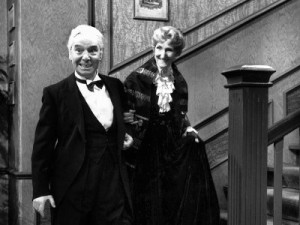 It was made in Hamburg in 1963, with Freddie Frinton as the elderly butler, James, and May Warden as Miss Sophie, his aristocratic mistress, whose 90th birthday it is. The table is laid for 4 (invisible) guests, clearly old suitors of hers, and James has to play each part in turn, and drink for them as well – sherry, champagne, wine, port… with the immortal words each time: ‘Same procedure as last year, Miss Sophie?’ – ‘Same procedure as every year, James!’
It was made in Hamburg in 1963, with Freddie Frinton as the elderly butler, James, and May Warden as Miss Sophie, his aristocratic mistress, whose 90th birthday it is. The table is laid for 4 (invisible) guests, clearly old suitors of hers, and James has to play each part in turn, and drink for them as well – sherry, champagne, wine, port… with the immortal words each time: ‘Same procedure as last year, Miss Sophie?’ – ‘Same procedure as every year, James!’
Even Germans with no other English whatsoever can quote these sentences, and are always hugely surprised to find that the British have no idea what they’re on about.
Feuerwerke – fireworks
At midnight the Sekt comes out – a sort of German champagne, and then church bells ring and the fireworks start – smaller ones in your own garden, or big spectacles in the town. In Cologne and Bonn these are on the banks of the Rhine and thousands of people turn out to welcome the New Year.
